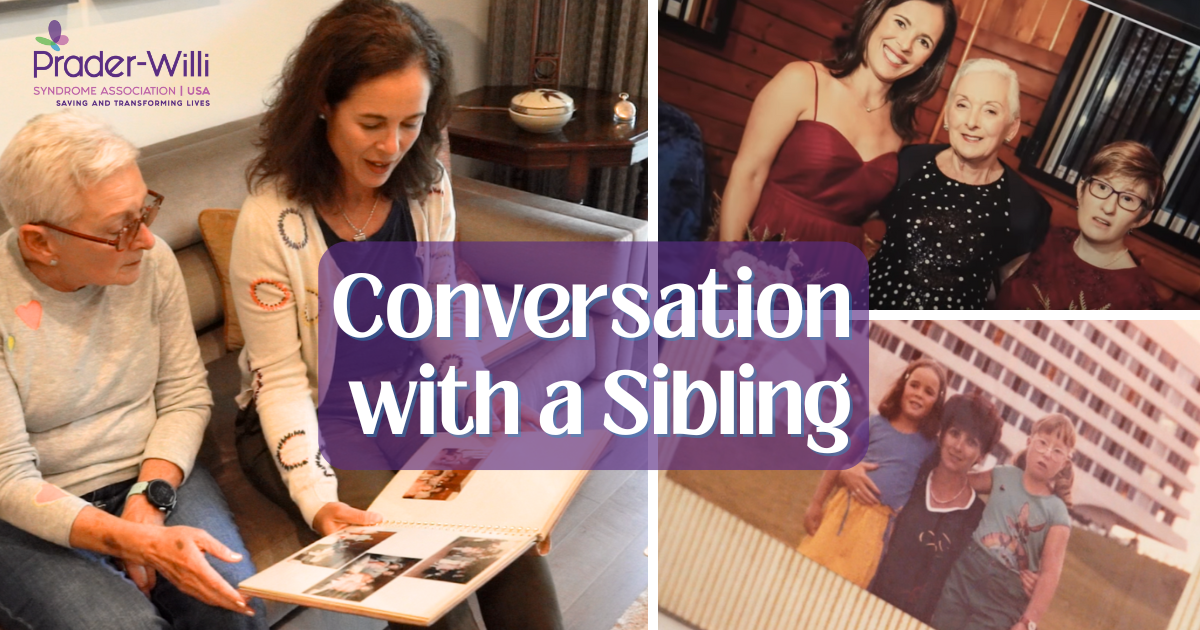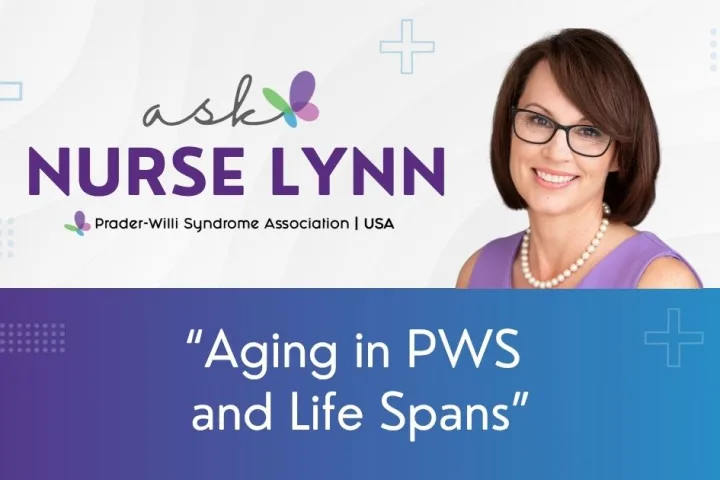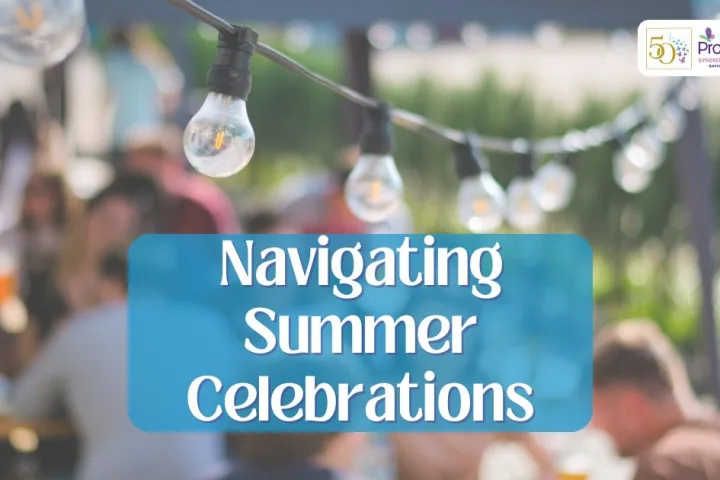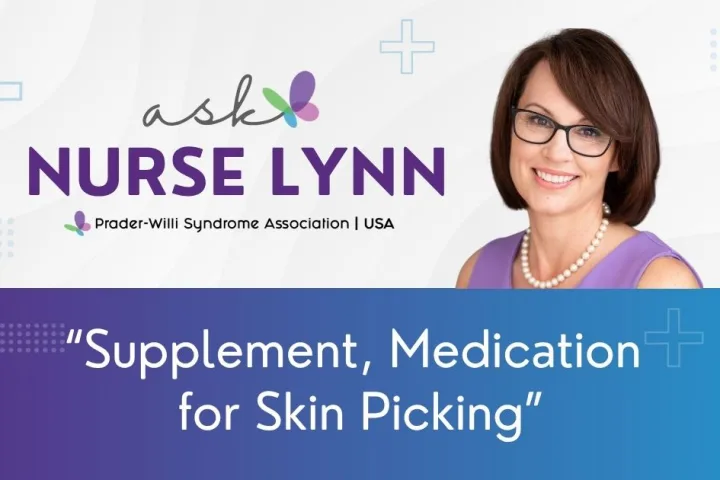Transcript from an interview by Carrie Larsen, Director of Marketing and Communications for PWSA | USA with Leora Saacks, adult sibling to Andrea (living with PWS).
Interview log:
I’m Leora, I’m Andrea Saacks’ younger sister. Andrea is 2 years older than me; she has Prader-Willi syndrome, and we live in Philadelphia. I live about half an hour from where Andrea lives in her group home.
What is your relationship with Andrea today?
She’ll come over for dinner, occasionally we’ll meet for an outing to a park or go get coffee, but mostly she likes to come to our house. She loves to play with my dog, I have older teenage daughters – she loves to see them, and more than seeing each other every few weeks, we check in on the phone very frequently. Andrea likes to be in touch.
What are some memories you have from growing up with Andrea as your older sister?
So, my oldest memories with Andrea, you know, we grew up in the same house together until I think she was about 12 years old and for as long as I can remember, I always knew that she was different. When we were really young, I think we still played together but I do have recollections of her having outbursts, of having tantrums, of sometimes being very difficult to be around. I knew that my friends also knew she was difficult to be around, so my memories are definitely kind of trying to manage around that as her sister.
I definitely remember if we had family friends, a lot of it was making sure she was included but also it was difficult because she couldn’t always act appropriately to be included but I remember – we had a pool – we grew up in South Africa – we had a pool at our house, she loved to swim, she loved to be in the pool. We had a little dog that she loved. So, I do remember being in the pool with her, I remember playing with the dog with her, so I definitely have those memories. I remember mostly playing with her outside – we had a jungle gym. I remember her enjoying the outside, being in the garden, being in the pool, being with the dog.
She went to boarding school when I was ten. We then immigrated to the U.S., and she stayed on at her boarding school until we were settled. Then she came over, I believe with my grandmother. So, since we were young, we didn’t live in the same house together but obviously have spent significant amounts of time together still with all the family. She joins us for all family holidays – we’re Jewish so we have a lot of Jewish holidays she joins us for. You know, birthdays – any kind of family milestones she’s with us and then lots of in-between – just casually getting together.
What is it like being a sibling of someone living with PWS?
I often get asked if I have siblings and I always have to sort of caveat with, I have an older sister, but she’s never felt like an older sister, and I think it’s hard for people to understand that. Certainly, in terms of age, as long as I can remember she’s the one who’s needed more, seemed to have acted younger than me. Our relationship is much more, I would say, me checking in with her, having to care for her, etc. It’s not a traditional sister relationship and it makes me sad because I would have loved to have a sister in a more traditional sense. And it’s also just that’s what it is. She’s so sweet and thoughtful and especially when my kids were young, she was amazing with them. She could sit on the floor and play puzzles and monopoly and play for hours. It’s harder as they’ve gotten older, they’re teenagers and they do their own thing more. She always bought them the most appropriate gifts, but it’s never been the traditional sibling relationship.
Do you have any advice for other siblings?
We, Andrea and I, have a younger brother who is 9 years younger than me so 11 years younger than Andrea and our relationships are very different. My relationship with Andrea and my brother’s relationship with Andrea are very different too. And I guess what I would say to other siblings is I think at some point you have a choice for what you want your relationship to be. I think it’s hard, it’s hard when you’re managing your own kids, when you’re helping with your parents, you don’t have your sibling to help with your parents. You can easily say I don’t have the capacity for this, or I don’t have time for this, or you can say it’s just part of my life and it’s part of my world and I have no judgment, I think that it’s really hard. I’m sure there are times when siblings assess what they can take on and what they can’t in their lives, and like I said, my relationship with my sister is very different than my brothers. We have different roles that we play in the family, and it’s been hard. It definitely is hard. I wish there were other ways to say it but it’s hard.
I will also say I have spoken to other siblings of Prader-Willi people in my life, through the years – not a lot but I’ve spoken to other siblings and something that seems to come up a lot is siblings who feel like the family attention was always on the person with the greatest needs, and again, because we were close in years, a lot of my childhood I feel like is my parents talking, worrying about, focusing on my sister. Again, my brother is a completely different situation because he’s so much younger. They never lived in the same house, there was a lot of separation that way and I think probably in many ways I’m more independent because of that.
How has PWSA helped you and your family?
I think the Prader-Willi syndrome association is phenomenal. I think it’s literally been a lifesaver for my family. I think having resources and people who really understand what the needs of a Prader-Willi person and the needs of a Prader-Willi family are about has been invaluable. Prader-Willi people are not like other people with disabilities, and they cannot be lumped together with lots of other advocacy groups for differentiated learners or people with physical disabilities, all the categories that you think of, a Prader-Willi person doesn’t fit neatly in that, and the needs are so specialized. Having an organization that truly gets it, that truly wants to be available, that really wants to help, and that wants to connect people has been very valuable. That’s where I’ve been able to talk to other siblings – again it hasn’t been a lot, but on occasion I’ve had an outreach, an email or phone call from someone who said I heard that you were a sibling. I think now with social media it’s even more helpful to see the lives of Prader-Willi people that are out there that you can connect with because most people’s lives are going to be different than yours with a Prader-Willi family member. I also think that PWSA has done an incredible job pulling together the right resources so whether it’s the expert physicians or the expert behavioral specialists or understanding where the residences are or what the options or lack of options are. To have that centralized hub that’s constantly working to pull together that knowledge is incredibly helpful because it’s like finding a needle in a haystack sometimes when you’re doing it on your own.
Leora specifically addressed Stacy Ward’s help:
For Andrea, we’ve had a lot of challenges with her group home and there have been some really tricky moments of communicating between the family and the group home. Quite honestly, that has not been a sufficient amount of trust, and just a difficult relationship. Stacy has been incredibly helpful in joining our conversations, joining our meetings – in many ways acting like a mediator who can both advocate for Andrea with an unbelievable amount of expertise but also have the respect of the group homes, knowing that Stacy is just someone who is looking out for the best interest of everyone involved. Having her presence, her actual time and thoughtfulness with us in the room, on the phone calls has been unbelievably helpful.
Watch the video by clicking the button below.
Share this!





 Jennifer Bolander has been serving as a Special Education Specialist for PWSA (USA) since October of 2015. She is a graduate of John Carroll University and lives in Ohio with her husband Brad and daughters Kate (17), and Sophia (13) who was born with PWS.
Jennifer Bolander has been serving as a Special Education Specialist for PWSA (USA) since October of 2015. She is a graduate of John Carroll University and lives in Ohio with her husband Brad and daughters Kate (17), and Sophia (13) who was born with PWS. Perry A. Zirkel has written more than 1,500 publications on various aspects of school law, with an emphasis on legal issues in special education. He writes a regular column for NAESP’s Principal magazine and NASP’s Communiqué newsletter, and he did so previously for Phi Delta Kappan and Teaching Exceptional Children.
Perry A. Zirkel has written more than 1,500 publications on various aspects of school law, with an emphasis on legal issues in special education. He writes a regular column for NAESP’s Principal magazine and NASP’s Communiqué newsletter, and he did so previously for Phi Delta Kappan and Teaching Exceptional Children. Evan has worked with the Prader-Willi Syndrome Association (USA) since 2007 primarily as a Crisis Intervention and Family Support Counselor. Evans works with parents and schools to foster strong collaborative relationships and appropriate educational environments for students with PWS.
Evan has worked with the Prader-Willi Syndrome Association (USA) since 2007 primarily as a Crisis Intervention and Family Support Counselor. Evans works with parents and schools to foster strong collaborative relationships and appropriate educational environments for students with PWS. Dr. Amy McTighe is the PWS Program Manager and Inpatient Teacher at the Center for Prader-Willi Syndrome at the Children’s Institute of Pittsburgh. She graduated from Duquesne University receiving her Bachelor’s and Master’s degree in Education with a focus on elementary education, special education, and language arts.
Dr. Amy McTighe is the PWS Program Manager and Inpatient Teacher at the Center for Prader-Willi Syndrome at the Children’s Institute of Pittsburgh. She graduated from Duquesne University receiving her Bachelor’s and Master’s degree in Education with a focus on elementary education, special education, and language arts. Staci Zimmerman works for Prader-Willi Syndrome Association of Colorado as an Individualized Education Program (IEP) consultant. Staci collaborates with the PWS multi-disciplinary clinic at the Children’s Hospital in Denver supporting families and school districts around the United States with their child’s Individual Educational Plan.
Staci Zimmerman works for Prader-Willi Syndrome Association of Colorado as an Individualized Education Program (IEP) consultant. Staci collaborates with the PWS multi-disciplinary clinic at the Children’s Hospital in Denver supporting families and school districts around the United States with their child’s Individual Educational Plan. Founded in 2001, SDLC is a non-profit legal services organization dedicated to protecting and advancing the legal rights of people with disabilities throughout the South. It partners with the Southern Poverty Law Center, Protection and Advocacy (P&A) programs, Legal Services Corporations (LSC) and disability organizations on major, systemic disability rights issues involving the Individuals with Disabilities Education Act (IDEA), Americans with Disabilities Act (ADA), and the federal Medicaid Act. Recently in November 2014, Jim retired.
Founded in 2001, SDLC is a non-profit legal services organization dedicated to protecting and advancing the legal rights of people with disabilities throughout the South. It partners with the Southern Poverty Law Center, Protection and Advocacy (P&A) programs, Legal Services Corporations (LSC) and disability organizations on major, systemic disability rights issues involving the Individuals with Disabilities Education Act (IDEA), Americans with Disabilities Act (ADA), and the federal Medicaid Act. Recently in November 2014, Jim retired.